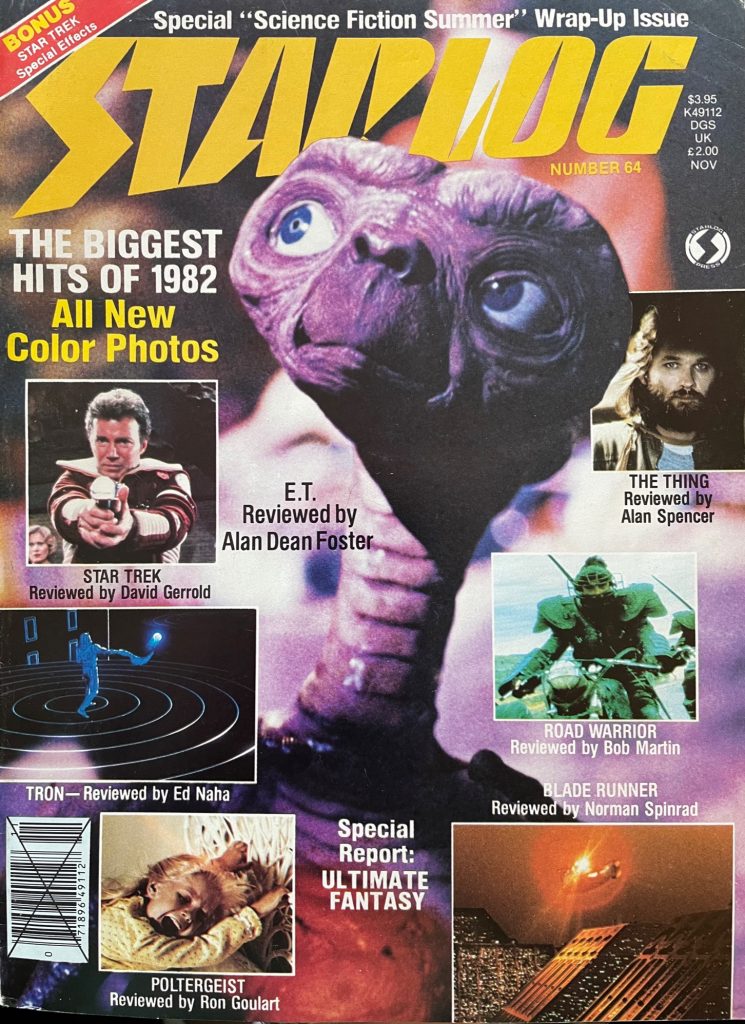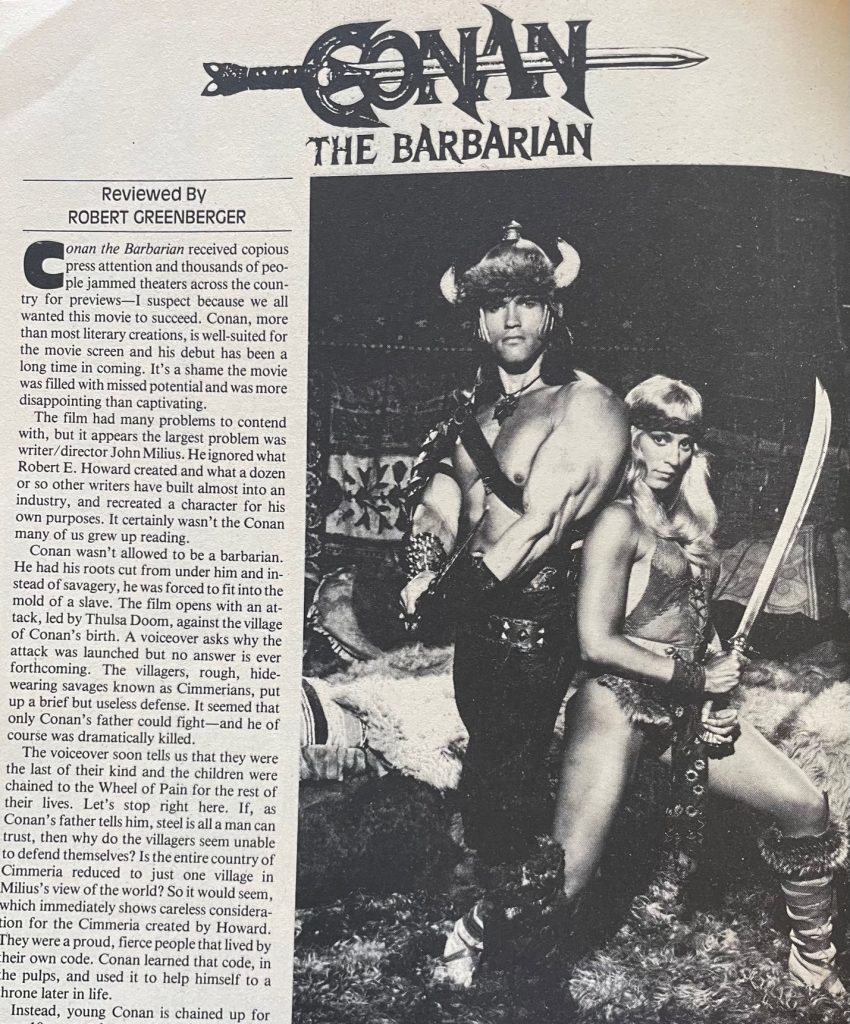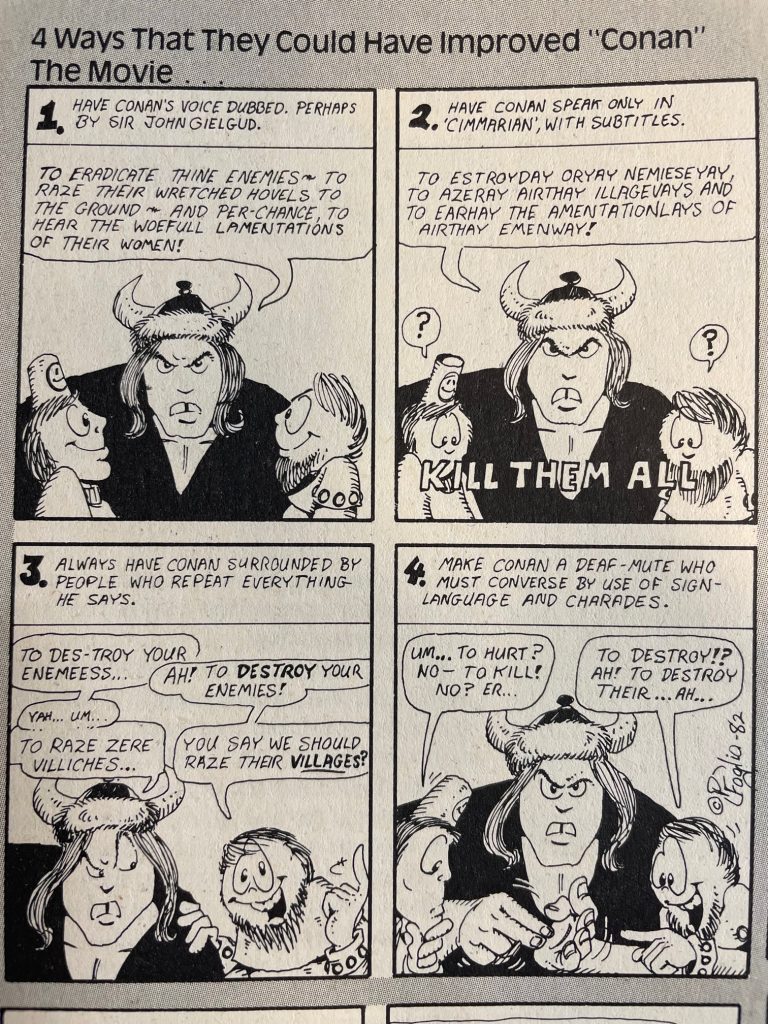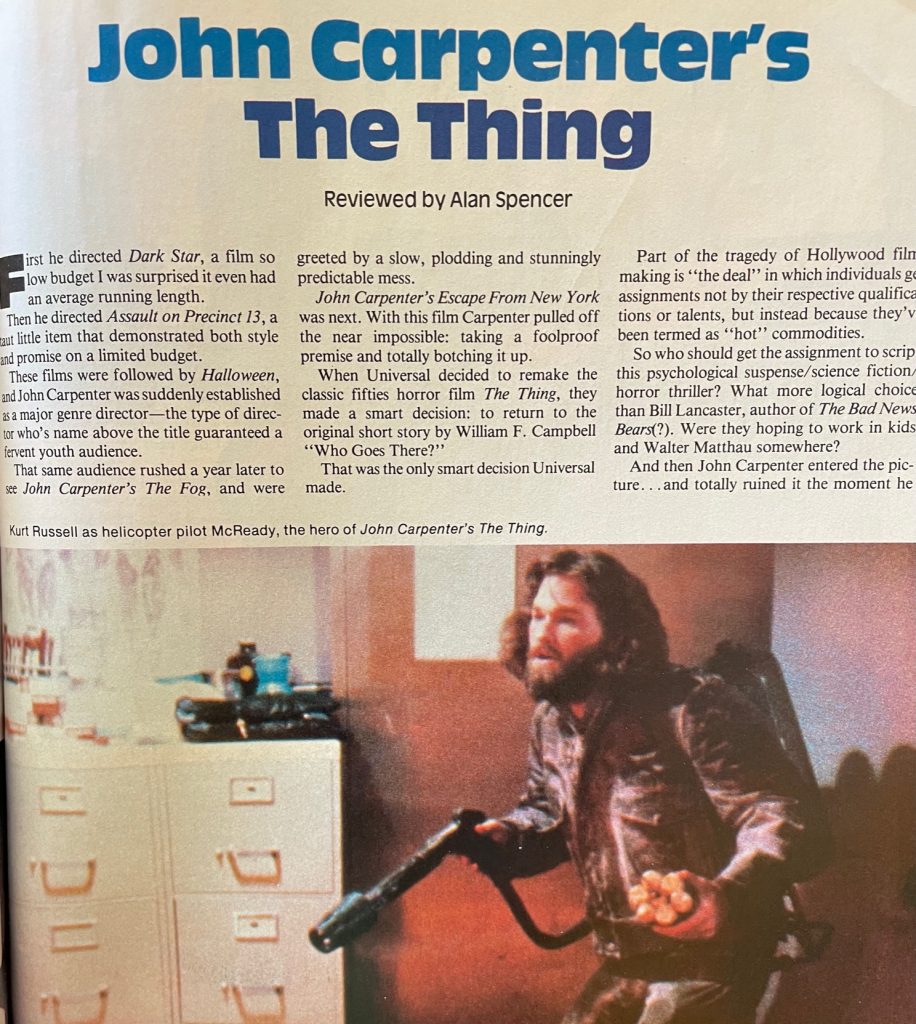Was 1982 the Best Year Ever for Sci-fi Film? The Starlog Summer Wrap-Up

I made an enjoyable foray into the November 1982 “’Science Fiction Summer’ Wrap-Up Issue” of Starlog Magazine over the 4th of July weekend, to see how well the reviews of various films have held up. When were the reviewers prescient, and when were they embarrassingly myopic? Did any of them have a sense that they were reviewing films during a year that is now regarded as one of the greatest ever for genre cinema?
1982 is a pretty significant year for science fiction, fantasy, and horror. In retrospect it is kind of incredible how many films that are considered iconic played in movie theaters that summer. Just check out this list of films reviewed: Star Trek 2: The Wrath Of Kahn. Conan. E.T. The Extra Terrestrial. Blade Runner. Tron. Poltergiest. John Carpenter’s The Thing. And while Mad Max 2 debuted down under in 1981, it made its American debut (as The Road Warrior) in 1982.
Wow.
Four of the critics liked the films they reviewed. Four did not. Which four?, I know you’re wondering, as did I – which is why I know this is a big hook that will keep you reading!
Star Trek 2: The Wrath of Kahn reviewed by David Gerrold
Of course Mr. Gerrold loved Kahn, and for all the reasons people remember this installment of the venerable franchise so fondly. Not much more to be said here.

Conan The Barbarian reviewed by Bob Greenberger
Bob didn’t like it. But this is one of those reviews you read that actually makes a compelling case for not liking it: The reviewer successfully takes your own fond memories of the film down a notch. He mainly disses it for how much the filmmakers strayed from Robert E. Howard’s character and backstory, and that’s a legitimate criticism.
The Cimmerians, that proud race of tough-as-nails barbarians, are demoted to a single village in which the only person who seems capable of fighting is Conan’s father. Conan’s young adventures that forged him into the throne-conquering warrior are substituted for being a slave for ten years.
Still, many of us enjoy the film today for its sheer entertainment value. It is kinda hokey, but it looks great and delivered sword and sorcery to the big screen at a time when few films did (and most of the others were even hokier than this). For better or worse, the 2011 Jason Momoa vehicle failed to dethrone this early Schwarzenegger hit; it remains the best Conan to reach the big screen.

Speaking of Schwarzenegger, one thing many critics pooh-poohed at the time was Arnold’s voice. There are even comics strips from cartoonist Phil Foglio in this issue making fun of it. And they thought that was a drawback for the future Governor of California! Of course he would go on to star in some of the biggest blockbusters of the next couple generations; and his voice, when you think about it, has become something of a national treasure. Everyone recognizes it immediately, and most people love it (or love to do their impression of it). It is a voice that has delivered some of the iconic lines of Hollywood blockbusters. “I’ll be bock.” “It’s not a tuma!” And that little Conan monologue Foglio makes fun of? Forty years later, many thousands of people know it by heart (including a few who probably never watched the movie). In fact, how many of you reading this right now can recite it line for line?
E.T. The Extra Terrestrial reviewed by Alan Dean Foster
Foster nails it. He not only illuminates why the film was so popular, but also identifies key reasons why Steven Spielberg is a great movie director. He lavishes praise on Spielberg’s many cinematic talents, and how well he works with children, and his childlike vision: “It’s Spielberg’s ability to see the world from the perspective of a child that may be his greatest gift as a filmmaker.”
These gifts have elevated Spielberg to a status he maintains forty years later as one of our greatest filmmakers, and it is staggering when you start to count up the number of classics he has directed or produced in nearly every film genre. From his insightful review, it’s a safe bet that Foster has never been surprised by this reputation.
Happily, Foster also gives due credit to Melissa Mathison:
Contributing enormously to this portrayal of adolescent American life is Melissa Mathison’s screenplay. As she demonstrated in The Black Stallion, her feel for children is no less sensitive than Spielberg’s, though it’s impossible to say who is responsible for what without having watched the film evolve. Nor should it be overlooked that this is a male-female collaboration. For example, it’s difficult to imagine Spielberg concocting the scene where Elliot’s sister dresses E.T. up in mommy’s clothes.
Speaking of Elliot’s sister, it’s kinda fun to come across one of the movie star’s earliest reviews:
Much has been made of Henry Thomas’ superb portrayal of Elliot … but Spielberg draws equally fine performances from his other youngsters, from Elliot’s older brother and his skeptical friends right down to little Drew Barrymore as the elfin little sister.
Foster also takes time to lavish praise on John Williams. Williams already had quite a few great film scores under his belt by 1982, and Foster notes that “Williams is one of the few composers writing for films today who really understands orchestration.” I also doubt Foster is surprised by the fact that Williams is now considered one of the all-time great film composers.
In conclusion, Alan Dean Foster, one of our venerable science fiction writers, delivered a brilliant review here that holds up well, with observations that still provide insight.
Blade Runner reviewed by Norman Spinrad
Spinrad takes time in the opening of his review to criticize the promotion of the film, by the studio and by Ridley Scott himself. They seemed hell-bent on distancing it from science fiction and selling it as a mindless action-adventure.
Spinrad sets you up to think he’s going to tear down the film:
My admiration of Philip K. Dick’s novel Do Androids Dream of Electric Sheep?, the stupid name-change inflicted upon the film version, the despicable fact that Phil Dick’s name does not appear in ads and posters… foolish and inane public statements by Ridley Scott and Hampton Fancher, and bad word of mouth in the science-fiction writing community all conspired to send me into the theater expecting a bummer.
However, he immediately sides with many other film critics at the time (and with most of us forty years later):
Far from being a turkey, a case can be made for Blade Runner as the best science-fiction film of the past decade, and certainly of the post-Star Wars crop.
He then goes on to make that case. And his unadulterated praise for the strengths of the film remains the general consensus to this day. “Rutger Hauer is brilliant as Roy Batty and deserves an Oscar for best supporting actor.” As for the city set:
The streets are crowded and grubby, people dressed in many exotic styles, the first multicultural future city I have ever seen attempted on film. Familiar ads for Coca-Cola, Atari, and Citizen are montaged with exotic oriental neon, exactly like the Ginza or Rappongi. Japanese fast food joints. A disreputable quarter of artificial animal merchants. A Soho-cum-Ginza-bar club you’d just love to debauch yourself in. Detail piled upon detail piled upon detail – a true masterpiece of design which makes any previous attempt at anything like a future city scene simply look ludicrous by comparison.
Spinrad is not all praise, though – he castigates the voiceover narration, the studio’s choice to dumb down the movie:
Get it? Well someone thought you wouldn’t. One’s intelligence is instead insulted by voiceover narration explaining that his partner must have been in the apartment and chosen to let Rachel live. Worse, far worse, the narration then goes on to undercut the most powerful line of dialogue in the whole film: ‘Too bad she won’t live. But then, who does?’ Deckard explains that in fact Rachel is different from the other replicants in that she doesn’t have a preprogrammed life-span, as if the tragedy, which, by a single brilliant line of dialogue has become the tragedy of our human mortality, is simply too real to leave in for the audience.
Still, on the whole, Spinrad declares that it is
An essentially true translation of Do Androids Dream of Electric Sheep?, it is a serious film for adults, and it is more of a real science-fiction film than just about anything else has been. Flaws and all, it is a minor masterpiece at the least, and anyone looking for a real science-fiction film of truly serious intent should go see it.
The most prescient point in Spinrad’s review is this observation:
And if it wasn’t Scott who imposed the voiceover narration, whoever did is a Phillistine. Even now, the film *could* be mightily improved some day upon re-release simply by cutting out all the narration.
Indeed, the Director’s Cut ten years later and the Final Cut in 2007 follow that advice.
Tron reviewed by Ed Naha
Naha gives due credit to the visuals, which were stunning at the time and are still admired (in contrast to most early computer-animated effects that have aged very poorly); but he takes to task the film’s lack of heart:
It just seems a shame that, with all the money, the care and the time poured into the motion picture’s visuals, nobody bothered to develop a storyline that would match the intensity of the computerized end of things, a storyline involving people you care about. Tron never bothered to take heed of a lesson that many moviemakers learned back in the 1950s. Special effects can never make a movie. (OK. Granted that many of the special effects back then weren’t all that special but, well, you get the idea.)
Naha concludes his assessment by noting, “It’s not that Tron is a bad movie. It’s not. But it is a dull movie… and dull movies are something that we already have enough of. Just check the week’s TV listing.”
While the film today is propped up by nostalgia, I think Naha’s review is not far off from the current critical consensus (as summed up by ROTTEN TOMATOES):
Though perhaps not as strong dramatically as it is technologically, Tron is an original and visually stunning piece of science fiction that represents a landmark work in the history of computer animation.
Poltergeist reviewed by Ron Goulart
Ron did not like Poltergeist. But he covers his bases well here by noting why many others will enjoy it:
I guess you shouldn’t let this lack of coherence bother you, since we don’t look for logic and a well-made plot on a rollercoaster ride or a visit to a funhouse and video games aren’t noted for their compelling narratives. What’s wanted is thrills, chills and spills, noise and flash. Watchers of movies like Poltergeist, the majority of them anyway, have similar expectations. Most critics go along with them.
With Poltergeist, I think that’s exactly the right analogy. It is the cinematic equivalent of a carnival dark ride. It really throws suspension of disbelief out the window, breaking quickly from its paranormal-investigators premise and going straight to monsters in your face. But it does that well and memorably, and many of us still watch it around Hallowe’en for the sheer fun of it.
Goulart is right on point to distinguish it from more grounded haunters like The Haunting (1963) or The Changeling (1980).Those films create a very different kind of chill, a special frisson because they play it straight. They have verisimilitude, a sense of reality, that a film like Poltergeist doesn’t even take a stab at.
Unfortunately, the huge success of Poltergeist influenced supernatural horror films to go over-the-top for decades, going the “rollercoaster” route in films that called for restraint, culminating in the nadir of big-budget dreck with 1999’s remake of The Haunting. Only in recent years have filmmakers gotten back to the less-is-more philosophy with films like It Follows (2014). Props also to movies like The Blair Witch Project (1999) and Paranormal Activity (2007) for reminding filmmakers that one doesn’t need a seven-figure budget to raise gooseflesh, and high-tech CGI usually has the opposite effect.
The Road Warrior reviewed by Bob Martin
Martin takes time to note how all the quirky and compelling characters are so well realized, finely acted, and memorable; and then sums up the other elements that have given this film now-legendary status in the final paragraph:
All of which is to say nothing of the beauty of this movie, which comes partly from the Australian landscape, but mostly from the long sequences told without dialogue that are composed with a painter’s eye. Nor did I mention its frequent humor, which ranges from dark to delightful, its incredible road battles, and dozens of the most spectacular stunts you will ever see on film.
No need to say anything more about them: To this day they have been unequalled except by writer-director George Miller in his latest (and fourth) foray back to that post-apocalyptic landscape: Mad Max: Fury Road (2015). No one else has out-Millered Miller, though many have tried.
John Carpenter’s The Thing reviewed by Alan Spencer
We save the worst review for last, in which one of the two greatest science-fiction horror films of all time (along with Alien, 1979) is compared to a city dump.
Not just the film but Carpenter’s oeuvre (which at that time, it should be noted, also included Halloween, Assault On Precinct 13, and Escape From New York) is skewered by Spencer:
John Carpenter’s The Thing smells, and smells pretty bad. It bears plenty of Carpenter’s trademarks as a director. It has no pace, sloppy continuity, zero humor, bland characters on top of being totally devoid of either warmth or humanity.
He goes on to suggest that Carpenter would be better suited to directing “traffic accidents, train wrecks and public floggings.”
Reading a review like this with Twenty-First-century hindsight provides plenty of laughs at the misguided, tone-deaf review’s expense. On a sad note, though, Spencer was not alone at the time. He himself notes in the article:
It says a great deal that Carpenter has been quoted to the effect of being ‘surprised’ that this newest abomination hasn’t garnered either box office or critical success. The Thing is Carpenter’s futile attempt to give the audience what he thinks they want.
That critical backlash and box-office failure really shook the director’s self-confidence, according to Ryan Lambie in Den of Geek (“John Carpenter’s The Thing Had An Icy Critical Reception,” 2018). It caused him to doubt and second-guess himself, and he lost some of his cachet in mainstream Hollywood.
Well, in retrospect Carpenter was just ahead of his time: It was a film audiences did turn out to want in the ‘90s, the ‘00s, and to this day. The people going to the theaters in droves for ET that year, no, they didn’t want an alien that took over your body and turned your head into a crab to scurry away. But there are probably about three generations of movie lovers now who consider it one of their favorite horror films.
In response to Spencer’s review from our vantage thirty-nine years later, I can only quote Luke Skywalker: “Amazing. Every word of what you just said was wrong.”

A final observation of my own, as a long-time film critic going back 35 years to my high school newspaper (my first review to see print was of a little flick called Bill And Ted’s Excellent Adventure): An honest critic realizes they cannot be objective; no critic is a Neutral Observing Eye. We all have our likes and dislikes, our biases and subjective tastes. An honest critic tries to faithfully report the reaction they had to a film, what response it evoked in them. They don’t second-guess whether their opinion is lining up with the general consensus of their peers, much less people who will be looking back thirty or forty years later.
There is room, however, to consider what merits a film might have that will appeal to some, even if it didn’t work for them personally (as Ron Goulart does in his review of Poltergeist).
Then there are those who try to ignore any merit at all in what they despise, who are just looking to trash it with the most damning invective. This might be expressing their own honest reaction, which is the first order of review; but it fails to consider that there may be strengths in a work, or a style, or a genre, that others appreciate and derive pleasure from to which they are insensate. It is a critic like Alan Spencer who most opens himself up to ridicule when his opinion becomes the minority: Not for the fact that he did not personally like something, but that he appears so incapable of recognizing why anyone else might like it.
What a summer that was for fans of science fiction, horror, and fantasy on the big screen. That year brought us wonders that still resonate.
And that was just the starting line-up. The second string included films like The Dark Crystal, Wes Craven’s Swamp Thing, Cat People, and even venerated low-budget fare like The Beastmaster and Q: The Winged Serpent. Terence Bowman on Den of Geek posited the question: “Was 1982 the best ever year for fantasy and sci-fi movies?” (2012, April 16).
What do you think?
I have encountered much the same thing in my re-reads of the ’69/’79/’89 sci-fi magazines. It is always fun to see what people thought of the classics before they were ‘classics’.
Re: Conan the Barbarian, I will say what I always say– the movie Conan isn’t REH’s Conan, but he is the kind of character that REH could have created. Once you square that circle, it’s all good.
The Thing really rubbed critics wrong. I remember that Siskel and Ebert both didn’t like it. I think that the world just wasn’t quite ready for this movie. It was a ‘horror’ film, but not a slasher flick or anything really all that recognizable. It is packed with actors who don’t look like actors, has no romantic subplot, and ends on a real downer.
I have a complex relationship to Beastmaster. It has great moments, but also very dumb moments. One of those movies that I’ll watch if I stumble upon it, but I won’t seek it out.
ah Blade Runner, HOT TAKE, i really enjoy the voice over that everyone hates. the fact you can tell harrison ford didnt want to do it makes it that much more depressed noir monologue to me. i wish there was a directors cut version that also kept the voice over, but scott mostly removes in in later cuts. but thankfully the dvd/bluray sets all incude the longer international cut that also keeps the voice over.
as for the Beastmaster, i love that movie, it has all the hallmarks of pulp for me, and also cheesy 80’s action, i suspend al preconceptions and i just enjoy it. sometimes things are more fun then they are “good” but that i A-OK.
Fantastic piece, Nick. I was 18 years old in 1982, in my first year of college, and I saw every one one of those films in the theater, with my friends. And yeah. Terence Bowman gets it right. 1982 was the greatest year in the history of SF cinema.
My only complaint? THE DARK CRYSTAL doesn’t deserve to be lumped in with second-stringers like Swamp Thing and Q: The Winged Serpent. It’s a classic of fantasy cinema that absolutely blew me away, and proved just what was possible with live-action animatronic puppets. I think it’s also stood the test of time better than some of its classmates.
What was the best film of 1982? THE THING gets my vote, followed perhaps by STAR TREK and BLADE RUNNER. But boy… what a year.
Yeah, boy howdy, that was a good year, although due to (lack of) age, the only movies I would have seen in the theater were those that were rated PG, so no Thing or Blade Runner or Road Warrior until the invention of the home video rental market several years later.
Great article! I was 13 in 1982 and lived in a small town with no theater. I was fortunate enough to have an aunt that took me to a couple of these. But I saw most of these films in 1983 on cable television—something that was fairly new at the time.
My one pushback is your take on Poltergeist. I think it’s a fabulous horror movie that still repays watching. The movie’s supposed curse involving the real-life deaths of several of the actors also adds some spookiness. And, if you’re familiar with some of the drama involved in the filming, it was also was basically directed by Spielberg, though Tobe Hooper (of Texas Chainsaw Massacre fame) was the “official” director.
Much the same as Steven Spielberg was also the director of The Goonies. Richard Donner is credited, but it’s 99% Spielberg’s vision. The story, the pacing, the editing, the music, the characters. And it looks nothing like Superman, The Omen or Lethal Weapon, but looks remarkably similar to Poltergeist, Raiders of the Lost Ark and E.T.
A shame being a snob isn’t a sin, this Alan Spencer guy belongs in that circle.
[…] Projects: Collaboration, like the partnership between Steven Spielberg and Melissa Mathison, exemplifies the magic of bringing diverse talents together. These collaborations strengthen your […]